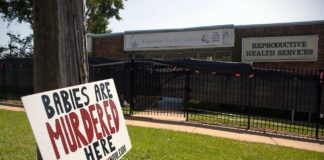When LGBTQ+ people go to the doctor, they are more likely to be refused medical services, blamed for their health problems and discriminated against than cisgender and heterosexual people, a new 19th News/SurveyMonkey poll has found.
Twenty-four percent of LGBTQ+ Americans said they had been blamed for their health problems while visiting a health care provider, compared with 9 percent of non-LGBTQ+ people. For LGBTQ+ and gender-nonconforming people, or those who said their gender was not male or female in addition to being LGBTQ+, that number jumped to 40 percent.
Sixteen percent of LGBTQ+ people — and 26 percent of gender-nonconforming LGBTQ+ Americans — recounted being denied or refused medical services at a doctor’s appointment, versus 7 percent of non-LGBTQ+ people.
Dealing with discrimination in health care can exacerbate the physical and mental side effects of minority stress that many LGBTQ+ people already experience, experts tell The 19th. LGBTQ+ people of color are even more vulnerable to the mounting effects of discrimination: 53 percent of LGBTQ+ people of color faced discrimination in health care, compared with 44 percent of White LGBTQ+ people.
Jacob Gammon, a 21-year-old Black gay man, moved to Twin Falls, Idaho, in 2019. When he went for a check-up last year, he said, clinic staff kept trying to get him to seek care elsewhere after learning he was gay.

“I felt judged based off of my medical information, but also my sexual orientation. So the conversation was different,” he said. Gammon has worked in health care for years — currently as a medical receptionist and pharmacy tech at a local clinic, and previously as a caregiver at Idaho assisted-living facilities. He knows intimately how patients are supposed to be treated.
After that experience, it took Gammon six to eight months before he felt ready to start looking for a new primary care physician again.
“I felt so discouraged,” he said. “I didn’t have people I could talk to about this, because people don’t understand the things that we go through as LGBTQ+ community, or even just individuals. They don’t understand that some of these things can keep you from life-saving attention that you need, like medical care, dental care.”
LGBTQ+ Americans are also more likely than non-LGBTQ+ Americans to have experienced more than one of the forms of discrimination asked about in the 19th News/SurveyMonkey poll, including being denied service or blamed for their health problems: 10 percent of LGBTQ+ people said they had experienced two kinds of discrimination, compared with 4 percent of non-LGBTQ+ people.
Kellan Baker, executive director and chief learning officer of D.C.-based LGBTQ+ health care provider Whitman-Walker, said it’s not surprising that so many LGBTQ+ people still experience discrimination at the doctor’s office.
Although the Biden administration bars federally funded health care providers from discriminating against patients for their sexual orientation or gender identity, 13 percent of LGBTQ+ Americans still live in a state with laws that allow medical professionals to decline to serve them based on religious beliefs, according to an analysis last updated this summer by the Movement Advancement Project, which tracks LGBTQ+ policy throughout the country.
It’s becoming more possible for health care providers to opt out of serving LGBTQ+ people, Baker said, as states pursue and pass anti-LGBTQ+ and anti-trans bills. “I think we’ve seen a ratcheting up of attacks on LGBTQ people over the last couple of years.”
Gabby Dibble, a 29-year-old White bisexual woman living in Albany, Oregon, feels like she has to hide parts of herself from her primary care doctor — namely, her sexual orientation.
“I didn’t want to be alone in a doctor’s office with someone who wouldn’t react well to that information,” she said. “It felt safer not to say anything.”
Although she’s been seeing the same doctor for about a decade, once Dibble started questioning her own sexuality and becoming more aware of the stigma that LGBTQ+ people face, she started feeling more uncomfortable around her doctor. After she read a public op-ed last spring from one of his former transgender patients accusing him of denying her gender-affirming care, more red flags sprung up in Dibble’s mind.
“It’s been really hard to trust him and be totally honest with him,” she said. “I think it’s important for patients to feel safe with their doctors.”
In The 19th’s poll, Dibble and Gammon both said that they had felt discriminated against because of their gender or sexual orientation while visiting a health care provider at some point in their lives. They aren’t alone. Twenty percent of LGBTQ+ Americans said they had experienced that discrimination — compared with 3 percent of non-LGBTQ+ people.
“This shouldn’t be happening in 2022, and yet here we are,” said Katie Keith, a health law expert at Georgetown University and founder of Out2Enroll, which annually reviews Affordable Care Act plans for LGBTQ+ and transgender inclusion. In the organization’s analysis for the 2022 open enrollment period, more than half of plans on the market said they cover necessary treatment for gender dysphoria — a “sea change” compared with previous years, Keith said.
SurveyMonkey conducted this poll online in English and Spanish from August 22 to August 29 among a national sample of 20,799 adults.








